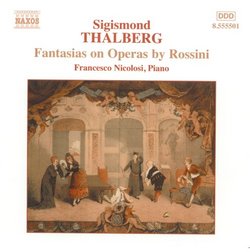| All Artists: Thalberg, Nicolosi Title: Fantasias on Operas By Rossini Members Wishing: 0 Total Copies: 0 Label: Naxos Original Release Date: 1/1/2002 Re-Release Date: 6/18/2002 Genre: Classical Styles: Opera & Classical Vocal, Chamber Music, Historical Periods, Classical (c.1770-1830) Number of Discs: 1 SwapaCD Credits: 1 UPC: 747313550128 |
Search - Thalberg, Nicolosi :: Fantasias on Operas By Rossini
 | Thalberg, Nicolosi Fantasias on Operas By Rossini Genre: Classical
|
Larger Image |
CD Details |
CD ReviewsOld Arpeggio Hexameron | 05/02/2006 (5 out of 5 stars) "Sigismond Thalberg's name in today's view of music history is almost exclusively linked with the great pianistic rivalry he shared with Franz Liszt. But Thalberg's life, influence on the composers around him, and the popularity of his music during his lifetime reveals that he had a far more substantial role in music history. Thalberg's propensity for and mastery of playing passages with complex arpeggios in both hands granted him the nickname, "Old Arpeggio." Without hearing Thalberg perform, it's difficult to know the extent of his skill. However, Thalberg's compositions, especially his operatic fantasias, illuminate not only the brilliant pianistic effects he was capable of, but also the beautiful cantabile qualities of his own piano-writing. Interestingly, Thalberg actually studied singing for five years. This Naxos release is a reissue from the Marco Polo label, and I feel it deserves five stars for the special first-recorded content and the excellent interpretations. The performances by the stupendous Francesco Nicolosi, the president of the Thalberg International Study Center, are marvelous and without defects.
In his fascinating book, From Paris to Peoria: How European Piano Virtuosos Brought Classical Music to the American Heartland, R. Allen Lott notes "Thalberg's emphasis on a singing tone and brilliant virtuosic display [coalescing] in his opera fantasias, in which a lyrical melody from an operatic source is surrounded by the most severe technical demands." The lengthy (nearly 20 minute long) Fantasia on Semiramide certainly reinforces Lott's assessment. Rossini's themes are inherently melodious, and Thalberg's dramatization and bravura piano-writing work together, creating a musically pleasing and virtuosic presentation. Mendelssohn also found much to admire in Thalberg's music, and in one of his Preludes (in E minor), Mendelssohn gives homage by utilizing Thalberg's specialized three-handed effect. Regarding Thalberg's fantasias, Mendelssohn says, "A fantasia by Thalberg (especially that on Donna del Iago) is an accumulation of the finest and most exquisite effects, a crescendo of difficulties and embellishments that is astonishing. Everything is so calculated and so polished, and shows such assurance, skill and superlative effects..." I agree with Mendelssohn: the long (20 minute) Fantasia on La donna del Iago is brimming with resplendent pianistic effects, and yet beneath the virtuosic clothing there is plenty of expressive music content, too. Thalberg's most substantial and famous operatic fantasy he ever wrote is arguably the Fantasia on Moise Op. 33. This was one of the pieces played in the famous duel with Liszt, and although several recordings are floating about, Nicolosi's performance is insurmountable and the best I've heard. The proof of this is not hard to find. After hearing Nicolosi, Steven Mayer's delivery (Liszt vs. Thalberg) sounds so chaotic and messy, I lament the fact that listeners might be put off by Thalberg just from that recording. Nicolosi, though, as the head of a quasi-Thalberg Society, is *the* interpreter of Thalberg's music. The Fantasia on Moise is definitely Thalberg's most accessible work, and I would assert it's also the most dramatic and beautiful. The slow melancholy of the Introduction is ravishing, but the powerful climax of this work is simply stunning: rocking waves of rich arpeggios envelop a sublimely lyrical theme pounded away in the bass. Bottom line: I may be too generous with my five-star rating of Thalberg's music, but I can't help being enamored with these gorgeous and glittering fantasias. Both David Dubal and Harold Schoenberg think Thalberg's compositional weakness is a lack of "harmonic imagination," and although Thalberg does not venture too far into chromaticism, his fantasies, with all their transparent virtuosity, still have a vocal power and tunefulness that makes them pleasant listening." |

 Track Listings (4) - Disc #1
Track Listings (4) - Disc #1